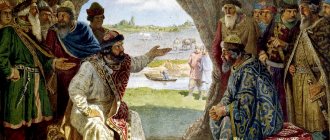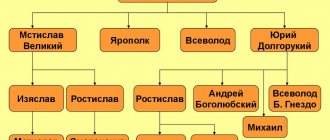«Teachings of Vladimir Monomakh
"(in some sources - “Teaching of Vladimir Vsevolodovich”, “Testament of Vladimir Monomakh to children”, “Teaching to children”[1]) is a literary monument of the 12th century, written by the Grand Duke of Kyiv Vladimir Monomakh. This work has been called the first secular sermon.[2]
Three works by Vladimir Monomakh have reached us. The first is “Teaching”, the second is a story about “paths and catches” (autobiography), the third is a letter to his cousin Oleg Svyatoslavovich.
Psalms 36 and 55 are quoted in the Teachings. Monomakh also mentions the following cities: Berestye, Vladimir, Kursk, Novgorod, Pereyaslavl, Polotsk, Rostov, Smolensk, Starodub, Suteysk, Turov, Chernigov and the center of the Vyatichi Kordno (Kordno).
Content
Monomakh sees the basis of morality (“the beginning of good”) in the “fear of God.” He further quotes the Psalter and Basil the Great, who call for patience and self-restraint. He then teaches his children about the need for "little things." He calls to pray the prayer “Lord have mercy,” to help the poor, not to destroy Christian souls, to be faithful to oaths, to be hospitable, to honor elders and priests, not to be lazy, not to get drunk, not to fornicate, not to lie. Further, the teaching is interrupted by the memory of Monomakh’s campaigns against the Vyatichi, Poles and Polovtsians. In total, Monomakh remembers 83 campaigns and 19 agreements that he concluded with the Polovtsians. Monomakh also mentions hunting wild martens, aurochs, deer, elk, boars, bears and “fierce beasts.”
Reasons for creating the Charter
The unified set of laws of Rus' before Vladimir Monomakh was the Russian Truth in the Long Edition. It was established at the beginning of the 11th century by Prince Yaroslav the Wise. A hundred years later, many of the norms in this collection could no longer clearly regulate the changed relations in society.
Vladimir Vsevolodovich’s charter was adopted under the pressure of aggravated social contradictions. Increased taxes led to impoverishment of the population. The people of Kiev were forced to borrow from moneylenders at interest. The indignation of the population in 1113 grew into an uprising. Vladimir Vsevolodovich, who accepted the Kiev throne after the death of his cousin Svyatopolk, began his reign by developing new laws.
Story
The “Instruction” has come to us as part of the “Laurentian Chronicle” (1377).[1] It was kept in the collection of manuscripts of the collector of monuments of Russian antiquity, Count A. I. Musin-Pushkin, and by pure chance it did not burn down in the Moscow fire of 1812 - it was at that time that it was taken from there by Karamzin.[3] Academician Likhachev calls the “Instruction” “a kind of collected works” of Monomakh and adds:
The huge political theme - to reinforce the new political system with moral discipline - was resolved in the Instruction with amazing artistic tact.[3]
The tradition of discussing ethical issues in Russian literature begins with the “Instruction.”[4]
Wikiquote has a page on the topic Teachings of Vladimir Monomakh
Charter of Vladimir Vsevolodovich
“Kill neither the right nor the wrong, and do not command him to be killed; even if you are guilty of death, do not destroy any soul.” Vladimir Monomakha
The Charter of Vladimir Vsevolodovich is one of the sections of the ancient Russian code of laws, Russian Pravda. It was compiled at the beginning of the reign of the Kyiv prince Vladimir Monomakh (1113-1125) with the aim of changing some of the economic, criminal and social norms. Articles of the Charter regulated the resolution of property conflicts, improved the position of the lower classes, and limited the influence of feudal lords and moneylenders.
Notes
- ↑ 1 2 Alexander Uzhankov.
[www.pravoslavie.ru/archiv/letopis.htm Russian chronicle writing and the Last Judgment]. Pravoslavie.ru. Retrieved January 10, 2013. [www.webcitation.org/66Mt389Gm Archived from the original on March 23, 2012]. - Berezovaya L.G., Berlyakova N.P.
History of Russian culture. - M.: Vlados, 2002. - T. 1. - P. 64. - 400 p. — (Textbook for universities). — ISBN 5-691-00712-2. - ↑ 1 2 Likhachev D. S.
Great heritage // Likhachev D. S. Selected works in three volumes. - L.: Artist. lit., 1987. - T. 2. - P. 133-154. - Berezovaya L.G., Berlyakova N.P.
History of Russian culture. - M.: Vlados, 2002. - T. 1. - P. 65. - 400 p. — (Textbook for universities). — ISBN 5-691-00712-2.
Document structure
The earliest source containing the new laws of Monomakh is the Trinity List of the Extensive Truth, dated to the 14th century. The original text is not divided into articles, so the beginning of the section is considered to be the red heading “Charter of Vladimir Vsevolodovich.” The code contains the following documents:
- Charter on cuts (debt interest);
- Law on Debts and Bankruptcy of Merchants;
- Charter on purchases (ruined peasants working off their debt to the feudal lord).
Many historians suggest that Articles 53-66 directly relate to the Charter of Monomakh. A number of researchers claim that the entire second part of the Extensive Truth, up to article 121, was compiled during the reign of Vladimir Vsevolodovich.
Links
12th century The Tale of Bygone Years · Teachings of Vladimir Monomakh · The Tale of Igor's Campaign · The Prayer of Daniel the Imprisoner · The Mother of God's Passion · The Deed of Devgenia · The Life of the Venerable Euphrosyne of Polotsk XIII century A Word about the Destruction of the Russian Land · The Tale of the Devastation of Ryazan by Batu · The Legend of the City of Kitezh · The Tale of the Life of Alexander Nevsky · Alexandria · The Tale of the Capture of Constantinople by the Crusaders · The Kiev-Pechersk Patericon · The Legend of the Indian Kingdom · Instruction of the Tver Bishop Semyon Chronicle tribes Slavic: White Croats · Bolokhovo · Drevlyans · Dregovichi · Dulebs (Volynians) · Vyatichi · Krivichi · Polyans · Radimichi · Northerners · Ilmen Slovenians · Tivertsy · Ulichi; Finno-Ugric: all · Merya · Muroma · Chud Zavolochskaya · Cheremis, Mordovians, Perm, Pechera, Em, Narova, Livs; Baltic: Golyad · Lithuania · Letgola · Zimigola · Kors · Yatvingians; Kyiv rulers before the collapse of the Old Russian state (1132) Askold and Dir · Oleg the Prophetic · Igor Rurikovich · Olga · Svyatoslav Igorevich · Yaropolk Svyatoslavich · Vladimir the Great · Svyatopolk the Accursed · Yaroslav the Wise · Izyaslav Yaroslavich · Vseslav Bryachislavich · Svyatoslav Yaroslavich · Vsevolod Yaroslavich · Svyatopolk Izyaslavich · Vladimir Monomakh · Mstislav the Great Significant wars and battles Campaigns of Rus' against Byzantium · Caspian campaigns of the Rus · Eastern campaign of Svyatoslav · Russian-Pecheneg wars · Russian-Polovtsian wars · Civil wars in Rus' · Battle of the Kalka River · Battle of the City River The main principalities in the XII-XIII centuries Vladimir-Suzdal · Galicia-Volynskoye · Kiev · Murom · Novgorod land · Novgorod-Severskoye · Pereyaslavskoye · Polotsk · Ryazanskoye · Smolenskoye · Turovskoye · Chernigovskoye Society Paganism of the Slavs · Dual faith · Christianity in Rus' · Veche · Druzhina Crafts and economics Money in Ancient Rus' · Crafts in Ancient Rus' · Trade in Ancient Rus' · Old Russian facial sewing Culture Old Russian folklore · Holy Rus' · Russian icon painting Literature Russian Chronicles · Russian Truth · The Word about Law and Grace · The Tale of Bygone Years · The Teaching of Vladimir Monomakh · The Word about Igor's Campaign · The Prayer of Daniil Zatochnik · The Word about the Destruction of the Russian Land Architecture List of ancient Russian architectural structures of the pre-Mongol period · Cross-domed churches of Ancient Rus' · Fortress structures in Ancient Rus'
Domestic and foreign policy of Monomakh
The rule of Vladimir Monomakh was not limited to strengthening the borders of the state. The prince cruelly punished everyone who tried to threaten his state. In 1119, the only prince who did not recognize the legitimacy of Monomakh’s power, Gleb, Prince of Minsk, captured the city of Slutsk. The reign of Vladimir Monomakh was cruel but fair. The prince could not tolerate Gleb’s willfulness, so he gathered an army and marched on Slutsk. In the battle that took place, Monoma won. Gleb was captured and taken to Kyiv, where he died in 1119.
The reign of Vladimir Monomakh continued and further strengthened the Russian state. The citizens of Kyiv hoped that Vladimir would remake the system of inheritance of power in order to avoid future wars between brother and brother. But Monomakh, who passionately loved his country, did not do this. The reasons for this are very clear. It was absolutely obvious that changing the system of succession to the throne would cause a new internecine war on the part of absolutely all the princes of Rus', who would not want to lose their right to the Kiev throne.
The reign of Vladimir Monomakh was glorious, which can easily be characterized by a period of truce within the country. The citizens of the world waited a long time, and now, with Vladimir coming to power, they got it. Monomakh himself lived 73 years. On May 19, 1125, Vladimir went to the bank of the Alt River, to the church that was built there on his orders. At the entrance to the church, in the very place where Prince Boris was once killed, Vladimir Monomakh died.
An excerpt characterizing the Teachings of Vladimir Monomakh
The man who devastated France, alone, without a conspiracy, without soldiers, comes to France. Every watchman can take it; but, by a strange coincidence, not only does no one take it, but everyone greets with delight the man whom they cursed the day before and will curse in a month. This person is also needed to justify the last collective action. The action is completed. The last role has been played. The actor was ordered to undress and wash off the antimony and rouge: he would no longer be needed. And several years pass in which this man, alone on his island, plays a pathetic comedy in front of himself, petty intrigues and lies, justifying his actions when this justification is no longer needed, and shows the whole world what it was like what people took for strength when an invisible hand guided them. The manager, having finished the drama and undressed the actor, showed him to us. - Look what you believed! Here he is! Do you see now that it was not he, but I who moved you? But, blinded by the power of the movement, people did not understand this for a long time. The life of Alexander I, the person who stood at the head of the countermovement from east to west, is even more consistent and necessary. What is needed for that person who, overshadowing others, would stand at the head of this movement from east to west? What is needed is a sense of justice, participation in European affairs, but distant, not obscured by petty interests; what is needed is a predominance of moral heights over one’s comrades—the sovereigns of that time; a meek and attractive personality is needed; a personal insult against Napoleon is needed. And all this is in Alexander I; all this was prepared by countless so-called accidents of his entire past life: his upbringing, his liberal initiatives, his surrounding advisers, Austerlitz, Tilsit, and Erfurt. During a people's war, this person is inactive, since he is not needed. But as soon as the need for a common European war arises, this person at that moment appears in his place and, uniting the European peoples, leads them to the goal. The goal has been achieved. Since the last war of 1815, Alexander is at the height of possible human power. How does he use it? Alexander I, the pacifier of Europe, a man who from his youth strove only for the good of his people, the first instigator of liberal innovations in his fatherland, now that he seems to have the greatest power and therefore the opportunity to do the good of his people, while Napoleon exile makes childish and deceitful plans about how he would make humanity happy if he had power, Alexander I, having fulfilled his calling and sensing the hand of God on himself, suddenly recognizes the insignificance of this imaginary power, turns away from it, transfers it into the hands of those despised by him and despised people and says only: “Not to us, not to us, but to your name!” I am a man too, just like you; leave me to live as a human being and think about my soul and God. Just as the sun and each atom of the ether is a ball, complete in itself and at the same time only an atom of a whole inaccessible to man due to the enormity of the whole, so each personality carries within itself its own goals and, at the same time, carries them in order to serve common goals inaccessible to man. . A bee sitting on a flower stung a child. And the child is afraid of bees and says that the purpose of a bee is to sting people. The poet admires a bee digging into the calyx of a flower and says that the bee’s goal is to absorb the aroma of flowers. The beekeeper, noticing that the bee collects flower dust and brings it to the hive, says that the bee's goal is to collect honey. Another beekeeper, having studied the life of a swarm more closely, says that the bee collects dust to feed young bees and breed the queen, and that its goal is to procreate. The botanist notices that, by flying with the dust of a dioecious flower onto the pistil, the bee fertilizes it, and the botanist sees the bee’s purpose in this. Another, observing the migration of plants, sees that the bee promotes this migration, and this new observer can say that this is the purpose of the bee. But the final goal of the bee is not exhausted by either one, or the other, or the third goal, which the human mind is able to discover. The higher the human mind rises in the discovery of these goals, the more obvious to it is the inaccessibility of the final goal.
Monomakh's reign
In the spring of 1113, after the death of Prince Svyatopolk, the reign of Vladimir Monomakh was to begin. The people of Kiev sincerely wanted to see him on the throne. Just like twenty years ago, the people of Kiev offered Vladimir to lead Kyiv. The prince refused because he never felt a strong desire to rule the entire country. In this case, according to the tradition of succession to the throne, Kiev was to be ruled by David, the eldest son of Igor, brother of Svyatopolk. But the people of Kiev, demanding that the reign of Vladimir Monomakh begin, started riots in the city. Ultimately, Vladimir Monomakh surrendered. And in the same year 1113 he entered Kyiv.
The reign of Vladimir Monomakh can certainly be called one of the most successful in the entire history of Kievan Rus. The reason for this was the prince’s intelligence, as well as his determination. Without a drop of doubt, he punished all the enemies of the country, both external and internal. Monomakh himself, as well as with the help of his sons, won many glorious victories. Monomakh's eldest son Mstislav went on campaigns against Livonia, and each time returned victorious. Monomakh's youngest son George went on campaigns to Bulgaria. These campaigns were also successful. Monomakh's middle son Yaropolk fought in the Polotsk direction. During these wars, he managed to capture three Polovtsian cities. The fame of Monomakh's victories spread throughout Europe. The Greek emperor was very afraid of the growing power of Kievan Rus. And for good reason. Monomakh sent Mstislav, his eldest son, to Adrianaple. Fearing a war with the Russians, the Greek emperor sent rich gifts to Kyiv in order to match Vladimir. Some of the components of these gifts were the orb and sceptre, Monomakh's hat and ancient barmas. It was these items that subsequently became an integral part of Russian statehood. These gifts were delivered personally by the Bishop of Byzantium, transforming the reign of Vladimir Monomakh from princely to royal. The bishop declared Monomakh the king of Rus'.
289
Teachings of Vladimir Monomakh
The teaching of Vladimir Monomakh shared, to a certain extent, the fate of the Word about Igor’s Campaign: also preserved in a single list - inside the Laurentian Chronicle for 1096 - it, like the Word, is replete with distortions and irretrievable omissions that cannot be accurately verified. Moreover, even the composition of the monument is unclear—the boundaries of its individual parts are elusive. Actually, the Teaching somehow unexpectedly turns into an epistolary passage - a letter from Monomakh to Oleg of Chernigov, which, in turn, without any visible connection is replaced by a series of final prayers. The relationship between these three main sections is still understood differently. Some researchers, in search of a truly Monomakhian edition of the Teachings, discarded not only the letter to Oleg, but also the subsequent afterword; others split even the main content of the Teaching into the teaching itself and autobiography. It is hardly possible to impoverish the monument in this way; however, it is possible and should be done. The only thing that is indisputable is the secondary, additional nature of the letter to Oleg. It is indeed impossible to allow the author of the Instruction to introduce into it his own letter that is not directly connected with it. Only a later editor could do this. Minus the letter, everything else is more correct and easier to consider as a single and integral work of Vladimir Monomakh himself.
There is no less disagreement on the question of the time when the Teaching was written. The solution to the question depends on how to understand the expression that appears twice at the beginning of the monument: “sitting on a sleigh,” to which once more is added: “on a long way.” If these words “on a long journey and sitting on a sleigh” are understood not in a figurative, but in a literal sense, it turns out that the “letterbook” - as Monomakh himself calls his Teaching - was composed precisely during Monomakh’s immediately described trip to the distant for him, north, to Rostov, when “words” met somewhere near Uglich from other senior princes conveyed to him an invitation to participate in the campaign launched by these princes against the younger princes - the outcasts Volodar and Vasilko Rostislavich. This dishonorable campaign, according to the chronicle, was conceived in 1099, which is therefore accepted by some researchers as the date of Monomakh’s Teaching. Such a conclusion immediately encounters, however, a number of insurmountable difficulties. From various places in the Teaching it is clear, firstly, that it was written by a man of advanced age, and in 1099 Monomakh was not yet fifty years old. Secondly, the precisely dated events in the Instruction extend much further than 1099, and the mention of them would have to be attributed, instead of the author of the Instruction, to some successor, which in itself is doubtful. Finally, thirdly, the direct meaning
290
in the words “on a long journey, but sitting on a sleigh” is unlikely. With the word “path,” Monomakh used the word “path,” in addition to ordinary campaigns and journeys, to also refer to the departure into eternity of a dying person: in a letter, for example, to Oleg, mourning the untimely death of his son, he consoles himself with the thought that “the way our grandfathers and fathers walked,” that is, That is, like Izyaslav, they died. We obviously have the same metaphor in the word “path”, which is still familiar to people’s lamentations and lamentations, in the cited passage from the Instruction, especially since the sleigh mentioned nearby is also a folk funeral symbol that has long been firmly rooted in Rus'. The ancient custom of burying on sleighs has been attested since the 11th century. and inclusive of the 17th century, chronicle news, miniatures of facial manuscripts, documentary data “on the order” of the burial of Moscow kings and queens, folk prints, and finally, popular prints. In the mouth of Monomakh, the expression “sitting on a sanekh” therefore meant the same as “on a long journey” and which was already correctly translated in the first edition by the words: “being at the door of the tomb.” But if this is how the introductory phrases of the Instruction should be understood, its author must be recognized as older than Monomakh was in 1099. Bearing in mind that the last of the campaigns listed in the Instruction - against the Minsk prince Gleb - is dated by the chronicle to 1117, when Monomakh, in fact, was no longer far from the grave, being 64 years old, and could, without exaggeration, call the life he lived long - “many years,” he says, “God will keep me from the hour of death,” - having this In view, the Teaching should obviously be dated to 1117.
The author's advanced age and the truly old man's intonations in his direct speech, abundantly scattered throughout the monument, are in perfect agreement with the genre of the work.
*
Parental teachings to children are one of the very common genres of medieval literature in general. Both in Byzantium, and in the West, and here, they readily resorted to it when presenting the then simple morality, as the simplest means of giving it the required impressiveness. Parental authority, from the point of view of the medieval worldview, was omnipotent. It is not without reason that one of the first successors of the Most Ancient Code puts into the mouth of the dying Yaroslav (under 1054) a series of instructions providing for what was desired in the second half of the 11th century. orderliness of inter-princely relations: “Behold, I depart from this light, my sons; have love in yourselves, for you are brothers of the same father and mother,” etc. Usually, the examples for this were the instructions to the son in Solomon’s parables, the book of Jesus son of Sirach, which was equally well known in those centuries, or the letters of the Apostle Paul to Timothy. A reworking of these canonical models was the teaching attributed to Patriarch Photius to the son of the Byzantine Emperor Basil, and the work of another Byzantine emperor, Constantine Porphyrogenitus, “On the Administration of the Empire,” also written in the form of a father’s teaching to his son, and the “Instructions” of the French king Saint Louis (in the chronicle of Joinville) , and an apocryphal teaching to the son of the Anglo-Saxon king Alfred, and, finally, the oldest of the medieval monuments of this group - the Anglo-Saxon “Faeder Larcwidas” (Father's teachings) of the early 8th century, preserved in the library of one of the prominent contemporaries of the last Anglo-Saxon King Harald. Married to the daughter of this king, Gita Garaldovna, Vladimir Monomakh, among the alien echoes of Anglo-Saxon culture, could learn from his wife “Faeder Larcwidas”. However, he imitated
291
of course, other, closer to it examples of the same genre - the word of Basil the Great, addressed to young men, “how a person should be,” the teaching of “a certain father to his son,” “the teaching of Xenophon to his son,” the instruction of Hesychius - the monuments included in the Izbornik of Svyatoslav 1076. The textual dependence of Monomakh’s Teachings on them is indisputable. Following them in the traditional content of some of his instructions about the fear of God and alms, about night prayer and abstinence, about how one should “not laugh too much, disgrace elders, not talk to absurd wives,” etc., Monomakh along the way makes a number of additional borrowings from other monuments: from the poetic Shestodnev of Basil the Great, from the Prologue, from the Lenten Triodion and the Psalter. Borrowings from the last two sources are curious in that they were taken primarily from the service of the first week of Lent and, therefore, could be a simple echo of the corresponding announcement in the church - a feature that is not indifferent in a monument that is not only a teaching, but also an autobiography at the same time.
*
The autobiographical element in the Teachings of Monomakh, in fact, makes this monument almost as out of the ordinary as the Tale of Igor's Campaign. This element is almost completely alien to the genre of parental teachings with their abstract didacticism. And its presence in the Teachings of Monomakh, from the point of view of the genre, is so original and unexpected that it even instills in some researchers distrust in themselves: it begins to seem that it was not due to the arbitrariness of the copyist that the teachings and the autobiography ended up being merged together. Nothing, however, justifies such distrust of Monomakh's literary independence. On the contrary, one thing with the other - traditional didactics with personal confession, autobiography with teaching - is intertwined in his “literacy” from beginning to end with purely authorial inseparability. This, as has been said, is the main historical and literary value of Monomakh’s Teachings.
Autobiography, as a literary genre, is represented very sparingly in our medieval literature: for such a relatively late monument as the “Life” of Avvakum, it is almost impossible to indicate any other predecessor than the same Teachings of Monomakh. At a distance of five and a half centuries separating them from each other, what, in fact, in our literature even partially resembles autobiography? The teaching of the Blagoveshchensk priest Sylvester to his son (the 64th chapter of Domostroi), several tirades from the correspondence of Ivan the Terrible with Kurbsky and an excerpt from the story of Nestor-Iskander and from the History of the Kazan Kingdom - just that.
The rarity of this genre—which, by the way, is not limited to the area of ancient Russian literature—is, of course, not accidental. Here, reader demand and author's interest are impossible, it must be, without some special, hard-to-understand, but equally effective general cultural conditions; It is no coincidence that both the era of Ivan the Terrible and the era of Avvakum - like, on the other hand, the era of Rousseau and the era of L. Tolstoy - are somewhat similar to each other. No less peculiar features and demands of Monomakh’s era also explain the emergence of his confession, especially since the beginnings of a literary confession are also in Vasily’s story about the blinding of Vasilko, which appeared at the same time, in the place where Vasilko lists Vasily’s plans
292
marches for them, exactly as Monomakh lists his “paths” in the Teaching.
So, what could be the value of his literary self-portrait in the eyes of Monomakh’s contemporaries?
It begins to emerge in relief, feature by feature, in the very first lines of the Teaching, all the time obscured, however, by its traditional didactics. In such a covert display of oneself there is a lot of literary skill and tact, and in the gradually emerging human image there is genuine charm and, in the opinion of contemporaries, attractive novelty.
The novelty already lay in the higher level of social and professional morality to which Monomakh raised his own image than that of the previous princes. This level is given immediately in the very first of the autobiographical excursions of the Teaching.
Inter-princely strife, the then source of national disasters, had long been tempered by the supposed inviolability of treaties, sealed first by the pagan “company”, later by the cross-kissing oath and letters. And yet, grossly selfish violations of such oaths have long been commonplace. Monomakh's father and uncles violated their agreement with Vseslav of Polotsk; Monomakh's cousins, Svyatopolk and David, also dishonestly deceived and crippled Vasilko, who trusted them. Class druzhina-princely morality of the X-XI centuries. She must have somehow come to terms with this. But Monomakh is no longer reconciled. “You have heard me from my brothers on Volz. Decide: Come to us, let us marry Rostislavich and take away their volost: if you don’t come with us, then we will be ours, and you will be yours.” The commonality of the expressions used here (the chronicle uses them more than once when speaking about the agreements of the princes) gives us the right to assume that the agreement proposed to Monomakh was just as common. But here is Monomakh’s answer: “And he said: “Even if you are angry, I cannot walk or cross the cross.” And having ordered, I took up the psalter in sadness, I devoured it, and then I took it out: Why are you sad, my soul? Why are you embarrassing me? and so on." During the time of Monomakh, people used to tell fortunes using the psalter. Monomakh also makes a riddle based on it, but he makes a riddle, preoccupied with a large social issue at that time, which he resolves right there, in fact and in principle, in a completely different way than the ancient custom allowed. And it’s remarkable with what purely literary skill this fortune-telling scene prepared the main feature of the emerging autobiography that Monomakh needed: the verse of the psalm that was taken out during fortune-telling: “How sad are you, my soul?” - being addressed to the fortuneteller, he himself, as it were, assigned to his mental structure the name “sorrow”; and this word in the language of that era meant much more than it means now. No less eloquent is another, equally accentuated autobiographical episode of the Instruction.
“Oleg came with the land of Polovech” against Monomakh, who was sitting as a prince in Chernigov, “and my squad was with him for 8 days, rowing about a little (that is, from behind the ditch) and not being able to [take] them into prison.” Luck, it seemed, could still be on the side of the besieged. Nevertheless, this is what Monomakh decides to do: “I took pity on the peasant souls and the burning villages and the monastery, and said: “Do not boast about the filthy,” and gave my brother (Oleg) his father’s place (Chernigov), and he himself went to his father’s place. I will Pereyaslavl " Here, too, everything is new and unusual, from the point of view of the warrior-princely morals of the 11th century, as in the episode with the refusal to “transgress” the cross. It has long been a custom in Rus' to use one or another finder from outside when the princes settled their patrimonial accounts with each other. Not talking
293
already about the “smart” grandfathers of the Monomakh generation - Yaroslav, Mstislav and their father Vladimir, the “good” fathers of the Monomakh brothers - the Yaroslavichs Izyaslav and Svyatoslav and their sons - did the same; they, too, did not hesitate to involve foreigners in their strife: Izyaslav led the Poles to Kyiv; The Svyatoslavichs, having lost their Chernigov patrimony, more than once invited the Polovtsian khans to Rus'. But Monomakh contrasts this princely custom with something completely different: the inviolability of the native land for anyone, under any circumstances, at any cost, even at the cost of one’s own inheritance, as long as “not to boast” is vile. The idea that the greatest importance for the prince was not his own squad-princely interests, but the interests of the whole people, with concern, first of all, not for himself, but for “the souls of peasants and burning villages,” about “the evil stink and the wretched widow,” was then a new thought: this can be seen, for example, from the chronicle story about Boyanov’s favorite, Monomakh’s grandfather Mstislav, who expressed, after the Battle of Listvenskaya, a century earlier than Monomakh, a surprisingly direct and convincing view of the exact opposite: “Who is not happy about this?”, he said, looking around the field of the battle he won ; “Behold a northerner lies, and behold a Varangian, and his squad is intact”; Mstislav felt no more sorry for the northerner Smerda, who fought side by side with his squad, than for their common enemy, the Varangian. Monomakh, on the contrary, not only suggested the princely concern for death, as a kind of political program, to the Vydubets chronicler Sylvester, but, as we see, he quite clearly proclaimed himself in the Instruction. Due to the presence of such a program, the Instruction is probably addressed not only to children, as it should be in accordance with the genre, but also to the reader in general. “My children or someone else will read it” - this is the formula of the author’s address twice repeated by Monomakh... In the ability to give one’s own image a touching imprint of constant “sorrow”, that is, concern for the homeland, one can see, we repeat, a great artist. Like fortune-telling over an open psalter, the departure from Chernigov, which was left voluntarily, is pathetic: “and the day of Chernigov was withered at St. Boris, and the Polovtsy were full of rage through and through, not in 100 squads, and with children and with wives, and they (the Polovtsians) would lick their lips at us, aka The wolves are worth it both from transportation and from the mountains, God and Saint Boris do not let them hurt me.” The words of the psalter there, the patronage of the brotherly lover Boris here, define all the same shade.
If both considered episodes of Monomakh's Confession raise his image high above the average level of his contemporaries, then in its other episodes, more brief, he is closer to the earth, to the environment and era that gave birth to him. Already one division of his labors lovingly enumerated on the “path” and “fishing”, i.e. on military and hunting feats, reveals in him not only a statesman, but also the son and grandson of his ancestors, with their uncomplicated outlook and simply achievable goals. But what a bubbling activity that knows no restraint or obstacles! “And from Chernigov to Kiev we traveled several times (about a hundred times) to visit our father; during the day I traveled until vespers; and all the ways are 80 and 3 great, but I won’t remember the lesser ones. And I created worlds with the Polovtsian princes without a single 20... And behold, I labored in fishing... I tied the wild horse with my hand in the forests 10 and 20... Tura threw me 2 on roses and with a horse, a deer me with one hand, and 2 moose with one leg trampled, and the other one hurt; The sword pulled away from the boar on my hip... the fierce beast jumped onto my hips and the horse with me was more powerful...” And again one cannot help but recall a style close in style to the environment that gave birth to it
294
The Tale of the Blinding of Vasilko: hunting terms are there too, but only as metaphors and comparisons; David follows the captive Vasilko “like a beast caught him”; the hunting term “whack” (to lure dogs or a falcon to prey) is applied in the same way to princes: Yaroslav went to the Ugri, “whack the Ugri against Volodar”; to the princely congress “privabish David Igorevich”; images of falconry are finally conveyed, as in the Tale of Igor’s Campaign, an entire military episode: the ally of the Russian princes, Bonyak, attacking the Ugrians from three sides, “knocking down the Ugrians like a ball, like knocking down a falcon in Galicia.” Monomakh’s confession clearly shows to what social environment, to what way of life such hunting images owe their penetration into literature.
Monomakh does not disdain any work; he is a consistent enemy of all laziness. “Even as my youth was about to do, I myself did the deed—in war and in fishing, night and day, in heat and winter, without giving myself rest.” There is no reason to suspect the veracity of these confessions. On the contrary, there is documentary confirmation of him in the surviving Epistle of Monomakh’s contemporary, Metropolitan Nikephoros, which characterizes him with the same features as the Instruction: this prince, says Nikephoros, “sleeps more on damp ground, avoids home, and rejects light clothes, walking through the forests , wears Orphan clothes, and only when entering the city, dresses like a ruler” (translation by Academician A. S. Orlov).
He is no less active as an administrator. “It was not in vain for the posadniks, nor for the birichi, that I myself did what was necessary: all the outfits in my house, I did, and I myself kept the hunting outfit for the hunters, and for the stables, and for the falcons and hawks”; here Monomakh, however, is rather a homely master, keeping up everywhere himself with that intent, hoarding pettiness, which he will later proclaim as worldly wisdom Domostroy.
Monomakh’s literary self-portrait is diverse and capacious: he is also a “great mourner of the earth,” a humane figure on a national scale, the prototype of all later Russian “sorrowers” of the earth - Alexander Nevsky, Dimitry Donskoy, Mikhail Skopin-Shuisky; but this is also simply a typical representative of the druzhina-princely layer in the Kiev state at the turn of the 11th and 12th centuries. - warrior, hunter, patrimonial householder, but with an already expanded cultural and moral horizon; a brilliant writer, a well-read scribe, but well-read in the literature of his time, and a writer who responds primarily to the demands of his own era: the image of a prince copied from himself - not a half-wild “silent voice”, but also not detached from everything an earthly monk (as his cousin, Nicholas the Svyatosha, became, for example, under the influence of the Pecheryans), the image of a sovereign “for all human affairs”, with a psalter, however, in his hands - this image undoubtedly answered the then deeply matured need of Kyiv society in something just like that. The guarantee of this is the brilliant completion of the literary era begun by Monomakh and the tanners in the Lay of Igor’s Campaign: the epically and lyrically expressed ideal of princely “sorrow” for the Russian land corresponds exactly to what Monomakh’s autobiography had expressed several decades earlier, using other literary means.
*
When and by whom was the Teaching of Monomakh included in the chronicle? Above we proceeded from the assumption that this was done by the anonymous compiler of the third edition of the Tale of Bygone Years, who worked
295
as proven, in the spirit of the Vydubetsky chronicle, around 1118. Now this assumption can be verified. The very fact that Monomakh’s work was completed in 1117, i.e. just on the eve of the compilation of the aforementioned chronicle, speaks in favor of the hypothesis put forward by (Shakhmatov). But one striking detail speaks for it even more convincingly in the news of the 3rd edition of the Tale, which corresponds to the last of Monomakh’s campaigns included in the Teaching. About Monomakh's campaign near Minsk in 1117, the Ipatiev Chronicle reports essentially the same thing as the Instruction, but with extra details, one of which may directly indicate the chronicler's familiarity with the Instruction as a whole: when Gleb Minsky began to beg Vladimir for a truce , “Volodimer,” we read in the chronicle, “take pity on the darkness that will shed blood during the fast days of Great Lent, and give it peace.” Above, the indisputable dependence of the Teaching on Lenten church services was already noted, a dependence that is hardly possible except under the fresh impression from them, i.e., indicating, therefore, that Monomakh completed his work during or shortly after the Great Lent of 1117. On the other hand, hand, and the given news of the chronicle, coinciding with the last event in the Instruction, not only explains with accuracy where Monomakh spent this fast in 1117 - near Minsk - but also puts, like the Instruction, Monomakh's peacefulness in direct connection with the penitential Lenten discipline . The chronicle news of 1117 suggests, therefore, that its compiler had an exhaustive acquaintance not only with the content of the Instruction, but, it seems, also with the circumstances, now unknown to us, under which the Instruction was written. And this leads to the conclusion that the Instruction was entered into the chronicle by the same person who owned the chronicle article under 1117, i.e., by the anonymous editor of 1118. At the same time, one cannot fail to pay attention once again to the apparently close literary relationships of this chronicler , who continued the work of Sylvester, and Monomakh.
But Sylvester’s work, on the other hand, was continued not only by the editor of 1118, but at the same time, one must think, by Monomakh. At least one feature of the Teaching cannot be explained other than by Monomakh’s acquaintance with Sylvester’s vault: complete silence in the weather list of Monomakh’s “paths” about that from his biography that was already depicted with sufficient completeness in Sylvester’s annalistic vault: neither about the death of Monomakh’s brother Rostislav in the waves of the flooded Stugna, nor about the three princely congresses convened by Monomakh, he himself does not remember in the Instruction - is it because he worked on the Instruction with the Sylvester Chronicle in his hands? If so, here is another hint at the existence of a very close connection between Monomakh and the Vydubetsk chronicle school.
*
In the Instruction, as it is said, a letter from Monomakh to Oleg of Chernigov is inserted - the same one whom the Word of Igor’s Campaign, for the strife “sown” by him, instead of Svyatoslavich calls with bitter irony “Gorislavich”. The letter to him begins inside the Teaching, probably with the words: “Oh, multi-passionate and sad az!” and was written much earlier than the Teaching itself, namely in the very year 1096, in which the events that gave rise to this letter fall. The struggle over Oleg’s patrimony, Chernigov, which had been unjustly given to Vladimir at one time, but which he ceded back to Oleg, as told in the Instruction, in 1094, resumed as soon as Monomakh and Svyatopolk
296
managed to defeat the Polovtsy who helped Oleg. Expelled from Chernigov, Oleg secluded himself in Starodub and, after the siege, was forced to accept the conditions of the victors. But the strife, like a fire, had already spread to more distant areas. The younger Monomakhovich Izyaslav, who had previously been sitting in Kursk, invaded the Murom-Ryazan possessions of Oleg, took possession of Murom, but in a battle with Oleg, who arrived there in time, on September 6, 1096, he was killed. This event was the reason for the correspondence between Monomakh and Oleg. However, the elder Monomakhovich, who was sitting in Novgorod Mstislav, was also involved in it, and moved from there to defend the Rostov possessions of his family, as soon as they were captured, following the victory over Izyaslav, Oleg. Having forced Oleg to leave Rostov and Suzdal, Mstislav says in the chronicle: “I came to Judgment and, sitting there, sent to Olgovi, asking for peace, saying: I am yours, come to my father.” He wrote the same thing to him before, before leaving Novgorod: “I will send you and my retinue to pray to your father and humble you with my father: if you killed my brother, that is, it is not surprising, in the army both kings and men perish " It was this letter to his father, sent by Mstislav, apparently already from Suzdal, that forced Monomakh to write, for his part, to Oleg. In a letter to him, he directly refers to the initiative in this correspondence of his eldest son: “Yes, I wrote, my son will force me... my husband sent me his husband and a letter, the river: “Let us get along and reconcile ourselves, but judgment has come for my brother; and he will not become a local, but put it on God, and he will stand before God; but we will not destroy the Russian lands." Heeding the advice of his eldest son, Monomakh sends words of reconciliation to Oleg: “You listened to your son, write a letter to you.” Before us, therefore, is an excerpt from a rather lively correspondence between three people who were direct participants in the event that gave rise to this correspondence. For Monomakh, it was primarily a family grief. That is why the image of Monomakh here is perhaps even more intimate than in the Instruction. He mourns the untimely death of his son with all the immediacy of the corresponding semi-pagan ritual: in his groans and laments it is not difficult to catch echoes of the people’s “cries”: he imagines Izyaslav “a body withered as if a new flower blossomed”; he asks to release his daughter-in-law, the young widow of Izyaslav, captured by Oleg, “and having finished with her tears, I plant her in place, and sit like a turtledove on a sus (on a dry) tree, jellying”; an image that has survived in popular laments to this day:
I will forge, oh dear, under the deer, Like an unfortunate coconut in a damp forest, I sit on a dry tree and a little tree, I sit on a bitter one and on an aspen tree.
Monomakh even directly refers to the ritual song, which is already a wedding cycle: he wants to see his daughter-in-law as soon as possible “so that I would (hugging) mourn her husband and her wedding, in a songful place: I did not see the first joys of her,” i.e. . ritual wedding feast, called “joy” (or “merriment”) in other ancient Russian monuments.
Monomakh, as a family man, was therefore very close to contemporary everyday forms of folk life.
As for when and where the letter to Oleg was included in the Instruction, this could most likely have happened in one of the northeastern chronicles of the late 12th century. or the beginning of the 13th century. The Letter speaks
297
about the patrimonial rights of the Monomakhovichs to the Rostov land; Moreover, the Monomakhovichs are the youngest in the family: the eldest Mstislav sits there, according to the definition of the Letter, “with his little brother eating bread today”; “bread educhi deden” is a commonly used formula of patrimonial rights in that era, familiar to both the chronicle and princely treaties. Mstislav’s “small” brother is precisely the founder of the Rostov-Suzdal branch of the Monomakhovichs - Yuri Dolgoruky. The letter to Oleg could thus serve as a legal document in favor of the very rights to Rostovshchina of the younger princes in the Monomakh family, who played an important role in the history of this land in the 12th-13th centuries. The prince's chronicle of that region and that era could have used the letter for his own purposes.
Having been included in the third edition of the Tale of Bygone Years by the Vydubets chronicler, the Teachings of Vladimir Monomakh organically joined the historical stories created in Monomakh’s circle and reflecting his activities.







